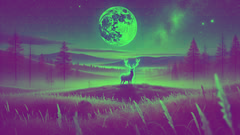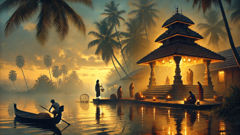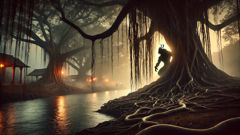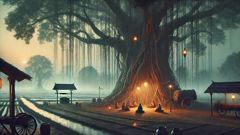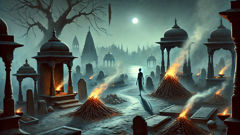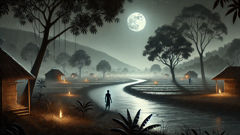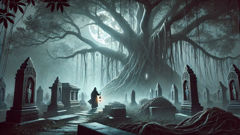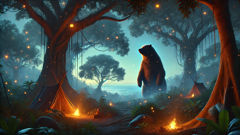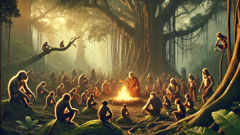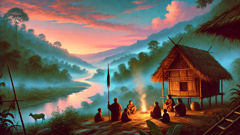Introduction
When the sun rose over the endless Eurasian steppe, its first rays spilled gold across dew-drenched grass and knotted wildflowers. Herds of aurochs grazed in the open, and rivers meandered through whispering reeds, shimmering with the promise of secrets old as the earth itself. Here, in this vast and restless land—where wind-scoured plains gave way to tangled forests and distant blue hills—the world still seemed young, and the boundary between the mortal and the mythical was gossamer-thin. The clans of the ancient Magyars gathered around their fires at night, voices mingling with the calls of wolves and the hush of owl wings. Their stories, heavy with longing and awe, told of gods who shaped the sky and spirits who roamed the wild, unseen yet always near. None was more beloved—or more haunting—than the legend of the Csodaszarvas, the Miracle Stag. Its antlers glowed with a silvery light. Its hooves left no trace, yet its presence changed fates. To behold it was to glimpse a destiny entwined with land and blood. Among these people lived two brothers, Hunor and Magor, sons of the mighty hunter Nimród, whose courage and curiosity were matched only by their devotion to each other. Restless under the same stars as their ancestors, the brothers yearned for purpose. Their hearts, forged in the silence and song of the steppe, would lead them on a chase that would shape not only their lives but the story of nations. The tale of how they pursued the Miracle Stag is a story of hope, hunger, and the search for belonging—a journey that echoes through the valleys and across the rivers of Hungary even now. As the moon waxed full and the world held its breath, the brothers' path began with a single flash of white between the trees, a glimmer on the horizon, and a dream that would change everything.
Hunor and Magor: The Brothers of Destiny
The sons of Nimród, Hunor and Magor, grew up beneath the vast sky of the steppe, where every sunrise carried the tang of adventure and every night sang with the promise of stories yet unwritten. Their father taught them to read the wind and the tracks in dust, to listen for the hush of wings or the stamp of hooves. Yet no lesson prepared them for the restlessness that stirred in their souls as they reached manhood—a yearning for more than the hunt or the warmth of the clan’s fire. Hunor, the elder, was broad-shouldered and resolute, his laughter ringing like bronze. He saw the world as a puzzle, to be solved with patience and cunning. Magor, younger by a year, moved with the easy grace of a wolf and bore eyes that seemed always fixed on some distant promise. Together, they shared an unspoken bond—a trust that neither words nor time could erode.
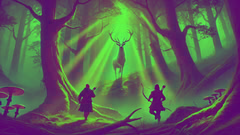
One crisp dawn, while the camp still slept, the brothers rose and slipped into the pale hush of morning. They spoke little, their movements synchronized by habit and affection. From a low hill they surveyed the world—a river curling silver among birches, the dark mass of the forest beyond, and the open plain where mist drifted like memory. Suddenly, Magor stilled. In the shadowy edge of the forest, something impossibly white moved. A stag—tall and proud, with antlers that flickered like torches in the dawn. Its presence was uncanny: the air shivered, and for a heartbeat, time itself seemed to pause. The brothers glanced at each other, excitement and awe lighting their faces. Without a word, they seized their bows and set out, moving as one.
The pursuit was swift, silent, and exhilarating. The Miracle Stag moved with impossible speed and grace, always just beyond reach. Sometimes it vanished among poplars or willow, only to reappear farther ahead, its eyes glinting like moonstone. Days slipped by. The brothers crossed rivers whose waters ran cold and clear, forded marshes where the air trembled with the songs of frogs, and skirted hillsides thick with wild rose and thorn. Each night, exhausted, they shared dreams of antlered shadows and a voice that whispered in a language older than words. The stag was more than an animal—it was a sign, a challenge from the gods, or perhaps an invitation.
On the seventh day, the land changed. The steppe gave way to tangled woodland, shafts of sunlight piercing the dense green canopy. Here, every footfall was muffled by ancient moss, and the air smelled of leaf-litter and rain. The stag moved more slowly, pausing to look back as if urging them onward. Hunor’s muscles ached, his boots were worn, and Magor’s lips were cracked from thirst, yet neither could abandon the chase. The forest felt sacred, its silence broken only by their breathing and the distant trickle of water. Suddenly, in a glade washed with gold light, the stag halted. For the first time, it did not flee. Its antlers stretched toward the sky like the branches of a cosmic tree. The brothers stepped forward, hearts pounding. But as they reached the edge of the clearing, the stag dissolved—its form breaking into motes of light that spiraled upward and vanished into the dawn. Hunor fell to his knees. Magor wept, both in relief and in grief. They understood, somehow, that their journey had only just begun.
The Dream of New Lands
When dawn broke after their vision in the glade, Hunor and Magor found themselves forever changed. The silence that followed the stag’s vanishing was profound—a hush so deep it rang in their bones. They gazed at each other, not with disappointment, but a sense of having crossed an invisible threshold. The land itself seemed to welcome them. Wild strawberries grew sweet in the shadows, birds darted bold and unafraid among the branches, and a brook ran clear nearby—a silver ribbon inviting them to drink and reflect. That first morning, as they knelt by the stream, Hunor spoke. His voice was quieter than usual, yet carried a new certainty. “This place was shown to us for a reason,” he said. Magor nodded, understanding unspoken. “We were chosen to find it.”
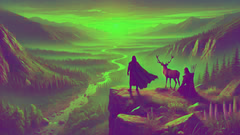
The days that followed were marked by discovery. The brothers explored the forest’s heart, uncovering hidden glades where ancient trees twisted skyward and wildflowers bloomed in impossible colors. They met birds with iridescent plumage and saw wolves who watched them with eyes full of ancient knowing but never threatened. At night, they dreamed of the stag again—always leaping ahead, always guiding them onward. Sometimes, in their dreams, they heard the voices of women singing from deep within the woods, a melody both alluring and melancholy.
Their longing for home stirred with every sunset, but the brothers knew their destiny was entwined with this new land. One evening, as magenta clouds drifted over the treetops, they climbed a rocky outcrop to survey their surroundings. From that vantage, they saw a landscape untouched by war or sorrow—a paradise waiting for its people. They spoke of returning to their kin, to share the story and lead their clans to this promised place. But in their hearts, another question grew: what if the stag’s guidance meant more than finding fertile soil? What if it called them to forge something new, to shape a destiny larger than themselves?
It was then that Magor suggested they travel farther—beyond the forest’s edge and across the gentle hills that rippled like the backs of sleeping beasts. Their journey carried them through grasslands alive with wild horses, along rivers where beavers built intricate dams, and into valleys where ancient stones whispered secrets of those who had come before. In every corner, signs of abundance and peace beckoned. Yet there was also a quiet challenge in the silence: to claim this land, they would need courage—not just to survive, but to build, to unite, and to honor the spirit of the Miracle Stag who had led them here. When they finally returned to their homeland, they brought not only tales of wonder but a vision—the promise of a new beginning.
Conclusion
The legend of the Csodaszarvas—the Miracle Stag—did not end with Hunor and Magor’s return. Their vision inspired whole tribes to journey across the steppe, to seek out the promised land glimpsed in dreams and illuminated by hope. Through hardship and wonder, these people crossed rivers and scaled mountains, guided always by the memory of antlers shining in moonlight. In time, Hunor’s descendants became the Huns, fierce riders who shaped history across Asia and Europe. Magor’s lineage grew into the Magyars, whose deep bond with the land flourished in song, story, and spirit. Though centuries have passed, their legacy remains: a testament to courage, to seeking beyond the horizon, and to honoring the mysteries that beckon us forward. Even now, when dusk settles over Hungary’s rolling hills and mist gathers in ancient woods, some say the Miracle Stag still runs—its hooves echoing the dreams of a people who will always remember how two brothers changed their world by daring to follow wonder.

